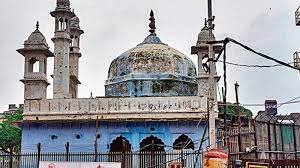In a significant development, a Varanasi court has accepted a plea seeking a comprehensive survey of the entire Gyanvapi Mosque premises by the Archaeological Survey of India (ASI). This decision comes shortly after the Allahabad High Court ordered a “scientific survey” of the Shivling allegedly found inside the mosque during a videography survey conducted last year. The acceptance of this plea marks a pivotal moment in an ongoing legal battle over the disputed site in Varanasi.
The Gyanvapi Mosque, situated in Varanasi, Uttar Pradesh, has been a subject of contention and legal disputes for decades. The mosque is believed to have been built by Mughal Emperor Aurangzeb in the 17th century, purportedly on the site of the original Kashi Vishwanath Temple. The temple, considered one of the holiest sites for Hindus, is believed to be the abode of Lord Shiva.
Last year, during a videography survey of the Gyanvapi Mosque premises, a claim was made that a Shivling (a symbolic representation of Lord Shiva) was discovered. This revelation prompted a petition seeking a scientific investigation into the entire mosque complex, to ascertain the presence of any structures or artifacts that could provide insights into its historical background.
Responding to the plea, the Allahabad High Court ordered a “scientific survey” of the Shivling, with the purpose of examining its origin and determining whether it was placed inside the mosque after its construction. This decision was hailed as a significant step toward resolving the long-standing dispute and bringing clarity to the historical aspects of the site.
Now, with the Varanasi court accepting the plea for an ASI survey of the entire Gyanvapi Mosque premises, the legal proceedings have taken a new turn. The court’s decision underscores the importance of a thorough examination of the entire complex to gain a comprehensive understanding of its history and potential archaeological significance.
The Archaeological Survey of India, a government agency responsible for the preservation and investigation of archaeological sites, has been tasked with carrying out the survey. The ASI is renowned for its expertise in archaeological excavations and research, and its involvement in this case is expected to bring a scientific and unbiased approach to the investigation.
While the court’s decision has been welcomed by those seeking clarity and historical accuracy, it has also sparked debates and discussions. Supporters of the plea argue that an ASI survey will help uncover the truth about the site’s historical evolution, settling the contentious issue once and for all. They emphasize the need for a scientific approach to shed light on the site’s past and preserve its heritage.
However, opponents express concerns over potential implications and the impact on religious sentiments. They worry that the survey might disrupt the religious practices and sentiments associated with the Gyanvapi Mosque. It is important to strike a balance between historical preservation and religious harmony, ensuring that the process is conducted respectfully and with sensitivity.
The acceptance of the plea for an ASI survey of the entire Gyanvapi Mosque premises marks an important milestone in the legal battle surrounding the disputed site. It reflects the judiciary’s commitment to a fair and evidence-based resolution of the long-standing dispute. The survey has the potential to provide valuable insights into the history and significance of the site, fostering a better understanding among different communities and paving the way for a peaceful resolution. As the ASI commences its investigation, all eyes will be on Varanasi, awaiting the outcome of this crucial survey.


